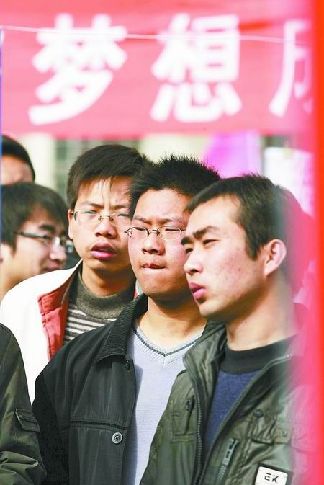Yang Hua was embarrassed when he had to go to the wet market at 6am to shop for the freshest bok choy, tofu, pork and other food to fill customer orders.
He had to jostle with other shoppers, examine the produce, haggle and then deliver it himself.
After all, he had a degree in business administration and shouldn't have had to stoop to this kind of menial, unskilled work.
 |
|
A job fair held in Zhengzhou, central China's Henan Province, on March 15, 2009, attract more than 50,000 university graduates.
|
"Initially I was a bit ashamed to be buying fresh food for other people," says Yang, one of the founders of shopping and delivery Website www.gv123.com.
It was started in Shanghai last November by 10 unemployed university graduates from Shanghai, Wuhan (Hubei Province) and the northeast.
"But from another angle, we are actually doing e-commerce," says the young man from the northeast. "After you work as a food shopper and delivery boy, there's nothing you cannot do." He got a taste of reality.
Yang and his fellows are a success story in the gloomy job market confronted by fresh university grads in the global economic crisis. They are enterprising, but most are risk-averse and the idea of a start-up, encouraged by the government, doesn't hold much appeal.
Across China, 6.1 million college and university students will graduate this year, adding to the 1 million known unemployed graduates from last year.
In Shanghai, 158,000 college and university students will graduate this year. Excluding those expected to continue their studies, around 127,000 graduates need to find jobs.
For Yang, business is getting better. He no longer has to go shopping. There are 70 to 80 employees, about 20 percent of them university grads, and Yang and his fellows plan to add another 10 to 20 for customer service and IT support.
But everyone will have to start from the bottom, elbowing their way, bargaining and delivering, grateful for a tip.
Yang and his friends had to dramatically lower their expectations for a high-status, well-paying first job with a private company after graduation.
Because of the global economic downturn, a degree in China - so passionately pursued for years - is no longer a passport to success. Many hopes were and are pinned to the piece of parchment.
As jobs are so scarce, graduates face difficult choices: Should they hunt for work despite the odds and lower their expectations? Continue their studies and collect another degree, riding out the crisis? Or take the civil service exam and hope to get a slot? Take a risk and start up a business, toiling without guarantee of success? Move to another city or western China? Live off their parents who invested heavily in their only child, paid tuition and hope to be repaid?